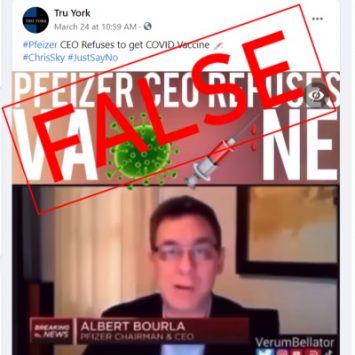SciCheck Digest
A video making the false claim that the Pfizer CEO “refuses” to get a COVID-19 vaccine has been circulating on Facebook. But the pharmaceutical company’s chief executive has said that he’s gotten his first shot.
Full Story
The chief executive officer for Pfizer, Albert Bourla, has gotten his first dose of the COVID-19 vaccine, he told Axios in early March.
 But a video posted to Facebook on March 24 is blaring the false claim: “Pfeizer CEO refuses [vaccine],” with an emoji that looks like the SARS-CoV-2 virus and a syringe.
But a video posted to Facebook on March 24 is blaring the false claim: “Pfeizer CEO refuses [vaccine],” with an emoji that looks like the SARS-CoV-2 virus and a syringe.
The video was shared by a page called “Tru York,” which has recently shared several other videos discouraging viewers from getting vaccinated. The page’s administrators are based in Canada and describe it as an “Entertainment Website · Political Party · Media/News Company.”
The video features a clip from an interview Bourla did with CNBC in December, in which he said that he would take the vaccine as soon as he could, but he didn’t want to set an example for “cutting the line” to get it earlier. Bourla described himself as “59 years old, in good health … not working on the frontline,” so he wasn’t prioritized for the shot.
Even though that statement is included in Tru York’s video, comments from viewers suggest that the written claim at the top of the video made a bigger impression. One such comment said: “TRANSLATION … I’m too rich and self important to kill myself taking a poison vaccine that I made.”
But, as we said, Bourla said in that interview that he intended to take the vaccine — and he has now gotten his first shot. So the claim that he “refuses” to take it is false.
The video also seems to suggest that Dr. Anthony Fauci, director of the National Institute of Allergy and Infectious Diseases, was hesitant to get a COVID-19 test. The video shows Fauci saying in an interview, “I have no symptoms, there’s no reason for me to take a test.”
But that interview was from March 15, 2020, about nine months before the Food and Drug Administration granted emergency use authorization to the first COVID-19 vaccine. At the time, testing for the disease wasn’t widely available.
CNN’s Brianna Keilar had asked Fauci if he would be tested following a public appearance where he had touched the same microphone and podium that had been touched by several other people.
“No, I’m not taking a test for the simple reason: I have no symptoms … I have been practicing pretty good social distancing,” Fauci said.
In an event that was covered by the media, Fauci received a COVID-19 vaccine on Dec. 22. (See SciCheck’s articles on each vaccine: “A Guide to Johnson & Johnson’s COVID-19 Vaccine,” “A Guide to Moderna’s COVID-19 Vaccine“ and “A Guide to Pfizer/BioNTech’s COVID-19 Vaccine.”)
As he was receiving his first shot, Fauci explained that he was taking the vaccine because he sees patients at the National Institutes of Health clinical center and “as important, or more important, as a symbol to the rest of the country that I feel extreme confidence in the safety and the efficacy of this vaccine and I want to encourage everyone who has the opportunity to get vaccinated so that we could have a veil of protection over this country that would end this pandemic.”
Editor’s note: SciCheck’s COVID-19/Vaccination Project is made possible by a grant from the Robert Wood Johnson Foundation. The foundation has no control over our editorial decisions, and the views expressed in our articles do not necessarily reflect the views of the foundation. The goal of the project is to increase exposure to accurate information about COVID-19 and vaccines, while decreasing the impact of misinformation.
Sources
Owens, Caitlin. “Pfizer CEO feels ‘liberated’ after taking COVID vaccine.” Axios. 7 Mar 2021.
Feuer, Will. “Pfizer’s CEO hasn’t gotten his Covid vaccine yet, saying he doesn’t want to cut in line.” CNBC. 14 Dec 2020.
Keilar, Brianna. “Fauci on possible lockdown: ‘Whatever it takes.’” CNN. 15 Mar 2020.
McDonald, Jessica. “The Facts on Coronavirus Testing.” FactCheck.org. 10 Mar 2020.
Ebbs, Stephanie. “Fauci receives vaccine, has ‘extreme confidence’ it’s safe, effective.” ABC News. 22 Dec 2020.